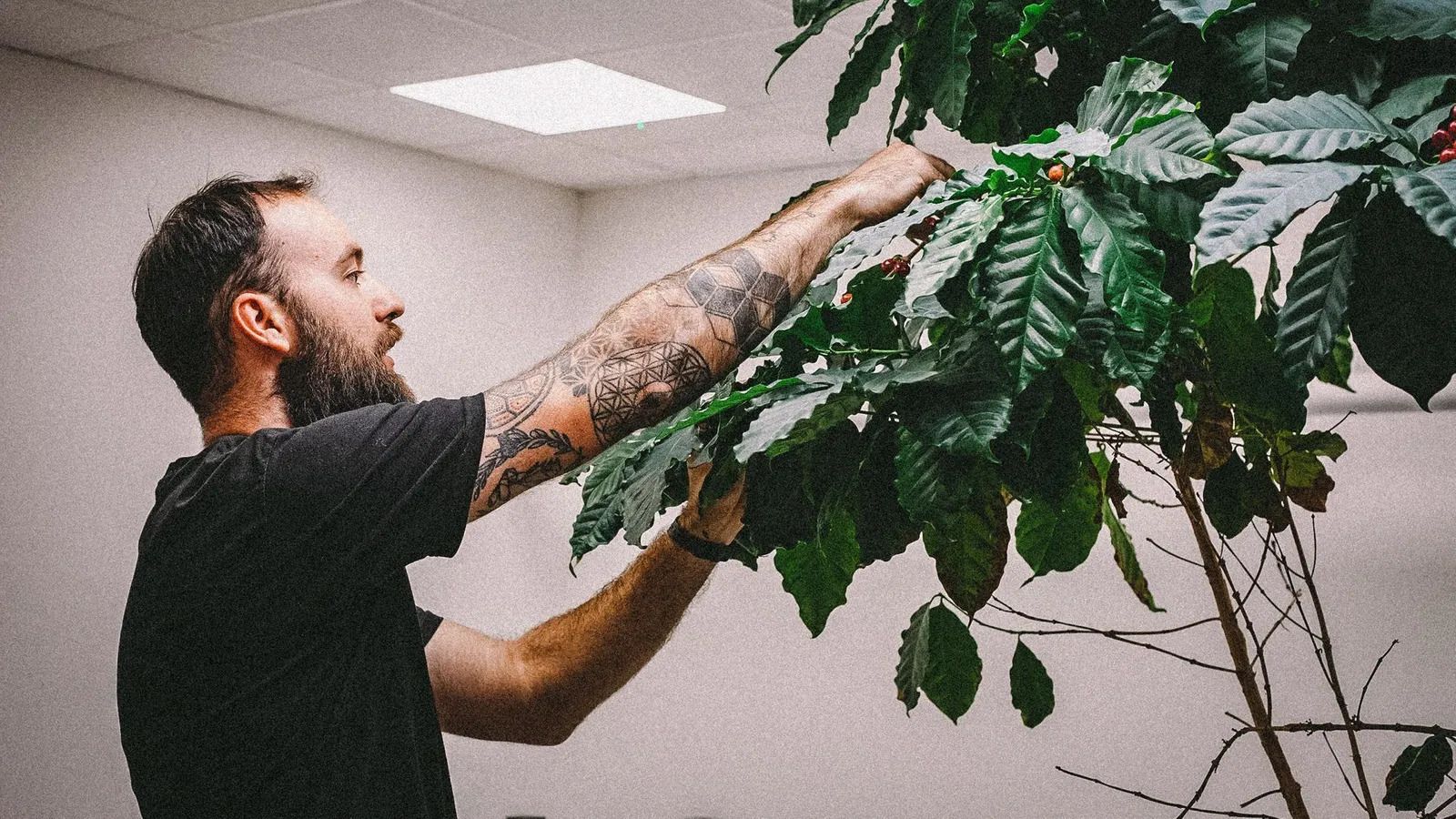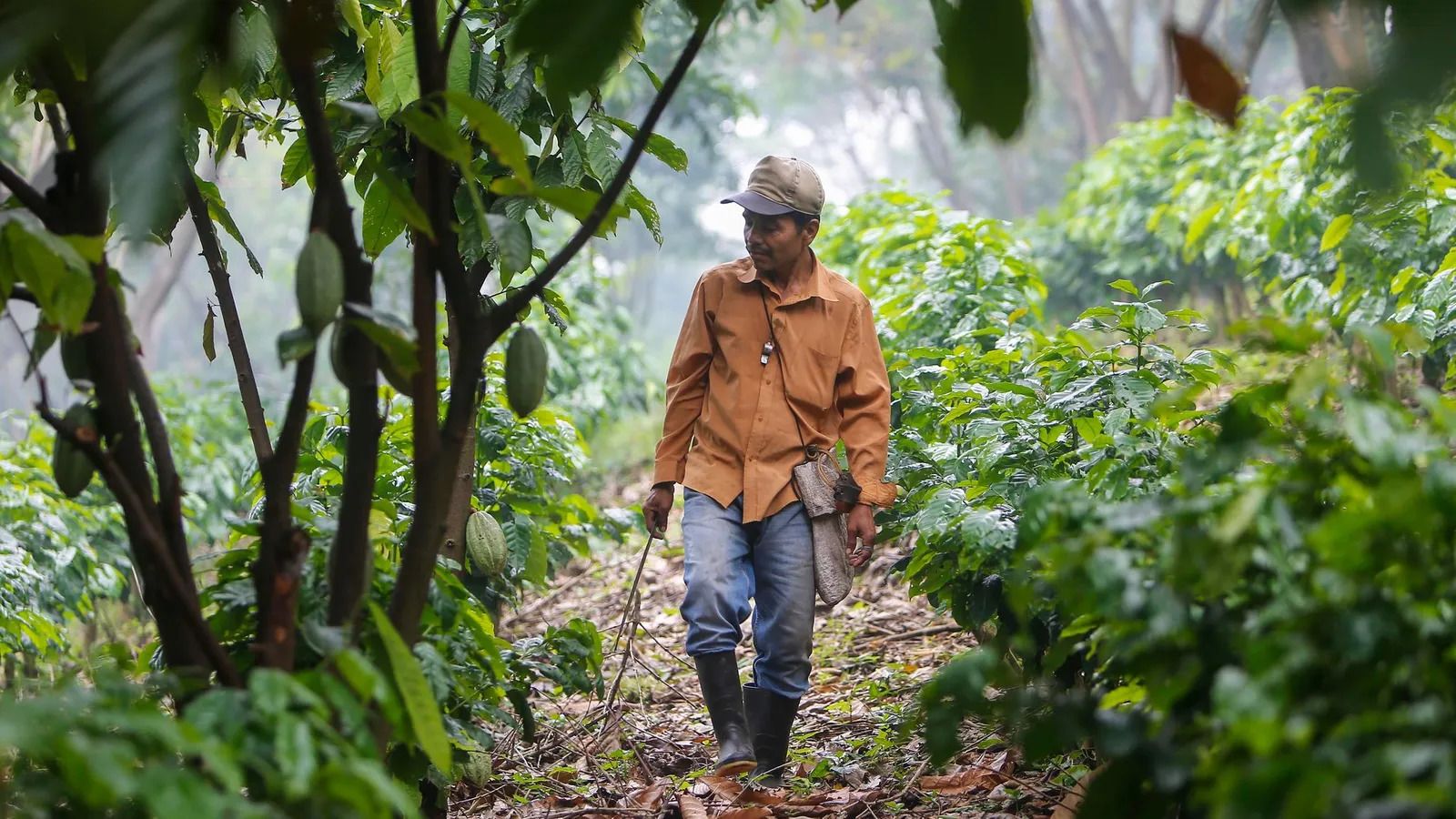
The coffee with zero air miles
The plant growing in the corner of Roastworks Coffee Co started life as a cherry, wrapped in parchment. It was given as a gift by an Ethiopian coffee agent and planted by the Little family out of curiousity. When their coffee roasting business relocated from Finland to Devon in south-west England in the 90s, the sapling came too.
The 30-year-old plant did nothing for years, says Will Little, who now runs the company his parents started, "making me a second-generation coffee roaster", he jokes.
But the coffee plant (coffea) finally flowered, to the surprise of Little, a few years ago. "The buds smelled like jasmine or orange blossom," he says. Little wondered if it flowered because the plant had been moved into a slightly warmer spot in the office, or maybe it had just decided that it was time.
Enthused by the new blossoms, he started feeding the plant, which was growing in "ordinary potting compost and some sand", with regular gardeners' fertiliser. His reward: a handful of cherries, perhaps 50g, "which is hardly anything in beans", he says.
For the next few years, the plant produced a modest crop, until 2020 when there was a bumper harvest of cherries – almost 400g in total. Now Little had enough to work with. After removing their flesh, 400g of coffee cherries will produce about 50g of green beans, which is just sufficient to roast.
The smallest coffee roaster Little had at hand was a tiny sample roaster, normally used to roast 30-40g of beans so that a coffee seller can quickly sample their product. He split his beans into two 25g batches and roasted half.
When his team gathered around to sip their office-grown coffee (one cup of coffee needs about 12g of beans, so their harvest didn't stretch far), to Little's surprise, it tasted good. "The chance of it tasting like **** was 99%," he says. "It could have tasted like cardboard, but it wasn't just drinkable – it tasted okay." Little sent off the remaining beans to a YouTuber who was also pleasantly surprised by the quality and described it has having a nutty, chocolatey aroma and flavour, though lacking some of the citrus elements of pure Ethiopian coffee.
If all this sounds like a lot of trouble to go to for a cup of joe, consider the climate cost of this popular morning beverage. A daily cup of coffee produces more than 300g of CO2 equivalent (CO2e), totalling 116kg of CO2 over the course of a year (or slightly more than the emissions from driving 1,000 miles in an average car). One cup of tea per day produces about 9kg of CO2e each year – and even a daily glass of wine has less impact on the environment than coffee (113kg CO2e each year).
But while growing coffee in your own backyard might seem appealing, our Foodprint Calculator shows that the carbon emissions from transporting coffee are negligible compared to the other carbon costs involved in producing the drink. About 50% of the total emissions from coffee comes from farming the crop, 20% from waste products, 17% from converting land for use in agriculture. Could these costs be reduced by growing coffee at home?
Try BBC Future's Foodprint Calculator to see the emissions from your own diet.
While reducing transport costs will make a small difference, what matters most is how and where coffee is grown. As the climate continues to change, areas that once were highly productive are becoming less productive, and new areas for coffee production are popping up.
The most popular cultivar, the arabica (Coffea arabica), is particularly sensitive to climate change. Oriana Ovalle-Rivera, a consultant in tropical agroforestry, and her colleagues modelled predictions about future coffee growing areas based on current estimates of climate change and found that higher altitudes will become more suitable. Kenya and Ethiopia are projected to become even better coffee growing regions, but the area suitable for producing coffee in Brazil could decline by as much as 60% and by up to 90% in Nicaragua as they are at lower elevations. Coffee production might creep uphill, they suggest, moving into previously unfarmed land.
 Jack Crocker, the roastery manager at Roastworks Coffee Co in Devon, UK, inspects his company's coffee plant covered in cherries
Jack Crocker, the roastery manager at Roastworks Coffee Co in Devon, UK, inspects his company's coffee plant covered in cherries
Altitude is key to quality coffee, says Little. "Coffee needs drier, cooler air like you get in the mountains," he says. Coffee grown at greater elevations is called "high-grown", and is widely considered to be better and fetches a higher price. Little says it is not because of the altitude itself, but the fact that coffee grown at greater altitudes ripens more slowly. The slower the growth, the denser the bean, and the tastier the product.
Little thinks that this slow ripening may have been what happened with his indoor coffee, possibly improving the taste. It just so happened that Little's office also provided some other key climatic conditions for coffee growth. "The average temperature for coffee growth is 19C," he says. "It's not like some tropical crops that need heat and humidity, so our office is about right. It never freezes, never falls below 19C in winter in the daytime: perfect for a coffee tree. In terms of humidity, the UK is about 60-80%. It's not perfect but it is not far off."
So a keen coffee grower might be in luck growing a plant indoors. But there are some things that will be near impossible to recreate, Little points out, like the volcanic soil that makes Ethiopian coffee so desirable. "There is a certain flavour imparted by the terroir," he says. "Putting it in Devon red soil doesn't mean it would be worse, but it won't be the same."
With increasing global temperatures, might we need to find new coffee varieties? It's a reasonable question to ask, says Helena Dove, who oversees the Kitchen Garden in the Royal Botanic Gardens at Kew, UK, adding that if we want to find more climate-resilient crops, now is the time to start looking.
Those climate-resilient crops might come from heritage or wild varieties. Researchers recently rediscovered a species of coffee (Coffea stenophylla) that had not been seen in the wild since 1954, but was once regarded as a prized variety. Stenophylla thrives in Upper West Africa in temperatures on average 6-7C higher than the temperatures at which arabica normally grows. The robusta variety of coffee (Coffea robusta) is also adapted to grow in warmer temperatures but has an inferior flavour to stenophylla. Other wild varieties, like Coffea affinis might also have useful disease resistence properties that could hybridised, or cross-bred, with crops.
Finding useful properties in wild varieties to diversify the crop gene pool might make it easier to grow crops in colder countries, too.
Producing wine in a country like the UK might once have been thought of as a niche pursuit, but today there are more than 500 vineyards in Britain. An analysis from 2018 identified a further 33,700 hectares of land suitable for wine growing in the UK – an area larger than the Champagne region and on similar terrain.
As the climate warms, though, the need for colder climate grapes might change. While most British vineyards are on the south coast, the analysis suggests that the best wine-growing regions are now slightly further north in East Anglia. In the United States, wine production has expanded to northern states, such as Michigan, due to warmer temperatures.
Wine has historically been produced in colder climates, like Canada, though these tend to be "ice wines" which are intentionally left to freeze on the vine to produce a sweet dessert wine. But regular wine is now grown and produced in Sweden, too, and some Scottish and Irish producers are having a go, with limited success so far.
Dove says that to prepare for a point in time when the climate in the temperate regions might support coffee, we should start looking for cultivars with resilient properties now. It could be a pressing step considering 60% of wild coffee varieties, like Coffea Stenophylla, from which we might find a resilient variety, are threatened with extinction.
To make a coffee plant hardier for a temperate climate, trees can be grafted onto a root stock. In essence, the trunk and branches of a fruiting tree are cut at the base and stuck to the roots and lower parts of a plant that is better adapted to the native climate, says Dove. The hardy roots provide resilience to temperature, moisture and soil conditions, while the trunk and branches flower and fruit as desired.
This is a centuries-old practice that has allowed fruit growers to adapt trees for colder climates. This means exotic fruit such as peaches and apricots can now be grown in the UK. "At one point we could never grow [them]," says Dove. "The trees were hardy, but the buds would freeze in February and drop off."
Root grafting is a common practice with fruit trees like apples, cherries, plums, apricots and peaches, says Dove. Anyone wishing to graft their own coffee plant would first need to identify a suitable root stock. Coffee is part of the Rubiaceae family of flowering plants, which while most of the members are tropical, does contain some temperate varieties.
After temperature and soil have been considered, a grower will need to think about how to get the coffee plant to fruit. Unlike tea plants, which will quite comfortably grow in colder regions, coffee not only needs to grow, but it needs to produce cherries.
 The areas suitable for growing coffee in Nicaragua could decline by up to 90% due to climate impacts, studies suggest
The areas suitable for growing coffee in Nicaragua could decline by up to 90% due to climate impacts, studies suggest
Some tropical crops can produce their fruits without the need for their native pollinators to fertilise them. These are called parthenocarpic plants – notable examples include cucumbers, bananas and pineapples. The resulting sterile fruit can lack seeds altogether, making some more pleasant to eat. A wild, fertilised banana or pineapple would be filled with little seeds and have a lot less edible flesh, for example.
But, some crops need to be fertilised. In the case of coffee, the bean is the product of fertilisation. Fortunately for home-growers, arabica plants can self-pollinate (but will produce more fruit if cross-pollinated by insects). So, the presence of a native pollinator is not essential.
Grafting has the added bonus that the root stock can kickstart flowering. The hormones that stimulate flowering and fruiting are found in the roots, so if a mature root stock is grafted to an immature tree, a grower can reduce some of the time spent waiting for a tree to mature (which, for a coffee plant growing in the right environment might be 3-5 years, rather than the 30 it took for Little's to mature indoors). This is very useful for commercial fruit producers.
So, with a little patience, the right conditions and some selective breeding, one might be able to grow coffee at home in temperate countries, but Little pauses to ask why. "Crumbs, there are amazing coffees in the world," he says. "What we could produce is nowhere close to the best from Colombia or East Africa."
Having toyed with the idea of growing British coffee commercially, he has settled on using his plant as an education tool. What does he recommend that you do with your handful of cherries each year?
"The best thing to do is to just eat them – they're full of antioxidants," he says. "And they'll leave you buzzing on a caffeine high."











